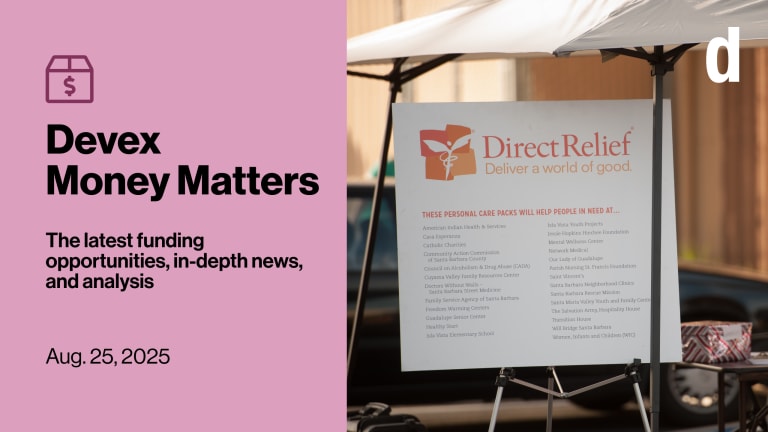How to engage with FMO on technical assistance
Dutch development bank FMO is broadening how it uses technical assistance — from co-financing for investees to ecosystem-building grants. Here’s what NGOs and consultants need to know to engage under its Strategy 2030.
As development funders face pressure to do more with less, the Dutch development bank FMO is ramping up how it uses technical assistance — not just to strengthen individual investments, but to help build the enabling conditions for investment itself. Technical assistance, or TA, refers to support provided by development funders to strengthen organizations or markets — whether by helping existing clients improve impact and operations, or by funding early-stage initiatives that create the conditions for future investment. In a recent Devex Pro Funding Live conversation, Abigail Thomson, senior technical assistance adviser at FMO, outlined how the institution is sharpening its approach to technical assistance under its 2030 strategy. So what does this mean for NGOs, consultancies, and other service providers looking to partner with FMO? Here’s what you need to know. From clients to ecosystems: FMO’s two tracks of technical assistance FMO structures its TA strategy around two main objectives. The first track is customer-value creation — a term FMO uses to describe tailored support for its existing clients. This includes supporting banks, agribusinesses, or energy companies to strengthen environmental, social, and governance, or ESG, practices, improve governance, or deepen impact in areas such as gender and climate. These efforts are usually co-financed on a 50/50 basis with the organization receiving the assistance, though exceptions exist when working with early-stage ventures or high-impact themes. The second track, market creation, is more outward-looking. It aims to strengthen the broader investment ecosystem in places where FMO isn’t yet active — for example, by funding feasibility studies, accelerators, or local fund managers. These initiatives are typically fully funded and often involve collaboration with other development finance institutions, or DFIs. FMO’s TA budget has more than doubled in the past four years, Thomson said, growing from €8 million to approximately €18 million annually. Thomson noted that its steady expansion reflects FMO’s increasing emphasis on TA as both a client service and a strategic investment tool. Around half of the current budget goes toward client-focused support, while the other half is now directed at the broader ecosystem, and efforts to identify or prepare future investment opportunities. A flexible toolkit for delivering support FMO delivers TA via five key mechanisms, each tailored to different client and project needs: • Co-financing: FMO and its clients jointly hire external consultants for targeted support — for example, ESG assessments or operational upgrades. This is the most common approach for technical assistance tied to existing investments. • Direct procurement: In some cases, FMO contracts technical providers directly, especially when the assistance supports broader strategic initiatives or market development priorities. • Partnership grants: FMO provides grants to NGOs, consultancies, or other partner organizations working on aligned goals — such as improving gender outcomes, piloting inclusive finance models, or strengthening climate resilience. • Repayable contributions: These are typically used with early-stage ventures that may generate returns down the line. The funds help unlock technical or strategic support without requiring up-front equity investment. • Convertible contributions: These start as grants but may be converted into equity under agreed conditions, allowing FMO to support growth-stage organizations with more flexible financing. This flexible toolkit allows FMO to tailor support to the needs of each partner or project. Where the money comes from To finance these efforts, FMO taps into a variety of funding streams. These include its own reinvested profits as well as delegated funds from the Dutch government and the European Commission — for example, through the European Fund for Sustainable Development Plus, or EFSD+. It also manages targeted funding from the U.K. government for specific initiatives in sectors such as forestry, energy, and climate. FMO also collaborates with peer DFIs on larger programs — including joint efforts such as the Africa Resilience Investment Accelerator, co-funded with British International Investment and Proparco. Individual TA projects can range from €50,000 (around $58,500) for targeted ESG advisory work to over €1 million for strategic ecosystem grants or fund manager support. How to partner with FMO There are two primary ways for service providers to work with FMO. The first is through procurements, which are either posted online or sent to a shortlist of bidders. In recent years, FMO has done more of this procurement via framework contracts. Organizations which qualify for framework contracts join a prequalified pool so they can be more rapidly engaged when there is demand from FMO clients. FMO uses these particularly for technical assistance in areas such as gender, ESG, and climate. The second path is more organic and tailored to client or partner needs and demands. Under its market creation strategy, FMO often initiates partnerships directly — reaching out to NGOs, accelerators, or other ecosystem players in priority geographies. These connections typically arise through existing networks or previous collaborations. While FMO doesn’t currently publish open calls for these opportunities, interested organizations can reach out through LinkedIn or general contact channels to explore alignment. Procurement at FMO is based on the European Commission’s PRAG guide — a detailed yet adaptable framework that governs both FMO’s own contracting and the vendor selection guidance it provides to clients. This structure ensures transparency and consistency but is flexibly applied based on project size, local context, and capacity. When evaluating proposals, FMO focuses on three core elements: methodology, past experience, and team qualifications. While DFI experience can be helpful, it’s not a prerequisite. Organizations with strong technical expertise and local knowledge — whether NGOs, consultancies, or hybrid models — are encouraged to engage. What sectors and themes does FMO focus on? FMO invests in three core sectors: financial institutions (particularly those lending to small and medium-sized enterprises); renewable energy; and agriculture, food, and forestry. However, its TA work often cuts across these investment sectors. Common themes include ESG and impact measurement, gender and inclusion, green finance, climate resilience and biodiversity. For example, FMO has partnered with Value for Women on a gender-focused TA framework and TechnoServe on inclusive business planning for agribusinesses. Got a pitch? Here’s how to share it There is currently no formal portal for unsolicited TA proposals. However, Thomson confirmed that the FMO vacancies page is up to date with tender opportunities and that FMO’s general information email does get routed to the appropriate teams. Thomson also recommended following FMO’s LinkedIn page for updates on events that FMO is participating in and to develop an understanding of current geographic and thematic investment priorities. What’s ahead for TA at FMO? While cuts to major bilateral aid programs have not yet affected FMO’s current TA programming, they could make future fundraising more challenging — particularly for market creation efforts. In this context, FMO sees its blended model as increasingly relevant: A way to strategically and intentionally deploy scarce grant capital for catalytic effects by pairing it with investment capital. Thomson noted that this may also lead FMO to work more deeply with private-sector groups to achieve sustainable development impact in their focus sectors. Want more briefings like this? Let us know — and stay tuned for upcoming live conversations here.
As development funders face pressure to do more with less, the Dutch development bank FMO is ramping up how it uses technical assistance — not just to strengthen individual investments, but to help build the enabling conditions for investment itself.
Technical assistance, or TA, refers to support provided by development funders to strengthen organizations or markets — whether by helping existing clients improve impact and operations, or by funding early-stage initiatives that create the conditions for future investment.
In a recent Devex Pro Funding Live conversation, Abigail Thomson, senior technical assistance adviser at FMO, outlined how the institution is sharpening its approach to technical assistance under its 2030 strategy.
This story is forDevex Promembers
Unlock this story now with a 15-day free trial of Devex Pro.
With a Devex Pro subscription you'll get access to deeper analysis and exclusive insights from our reporters and analysts.
Start my free trialRequest a group subscription Printing articles to share with others is a breach of our terms and conditions and copyright policy. Please use the sharing options on the left side of the article. Devex Pro members may share up to 10 articles per month using the Pro share tool ( ).
Raquel Alcega leads the data research and analysis at Devex, providing advice to organizations on the latest funding and programmatic trends that shape the global development space. She also heads up the news business content strategy and designs internal knowledge management processes. Prior to joining Devex’s Barcelona office, she worked in business development in Washington, D.C., and as a researcher in Russia and Mexico.








